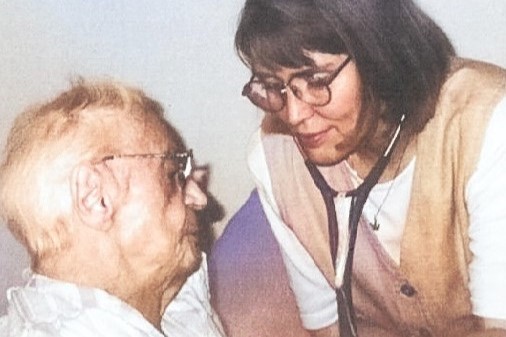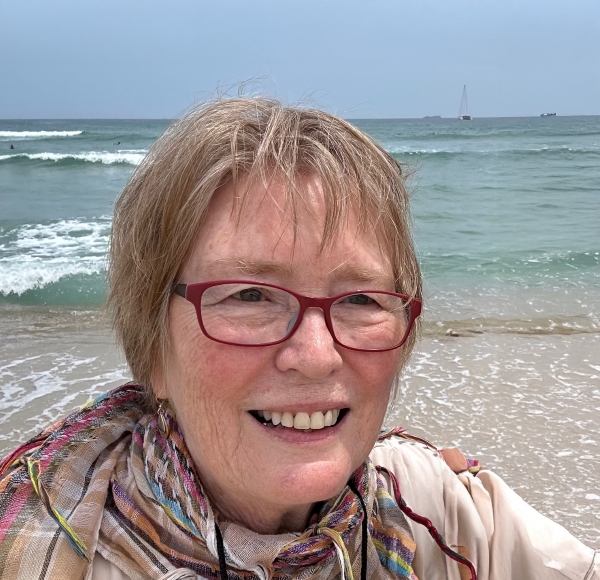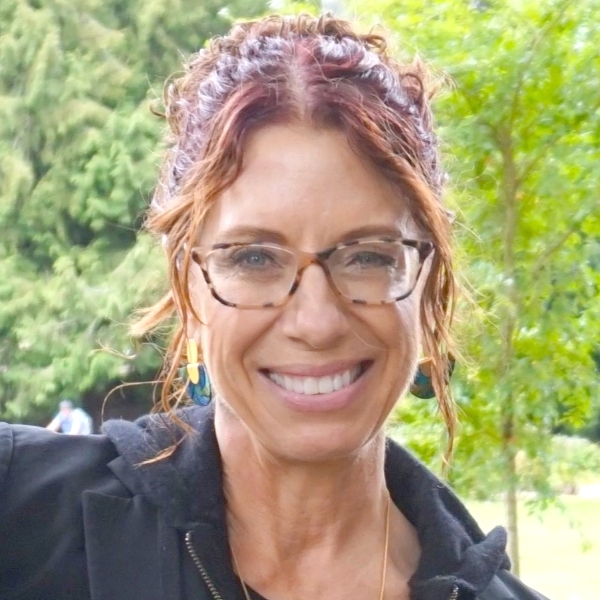
Housecall Providers Founder Dr. Benneth Husted on a house call.
By Dr. Benneth Husted, Founder

When I began making house calls in Portland in 1992, I saw firsthand how many medically vulnerable individuals had gone years without care simply because they couldn’t leave their homes. By 1995, it became clear that expanding services was the only way to sustain the practice. That realization led to the founding of Housecall Providers as a nonprofit, securing funding to ensure homebound patients could receive the medical care they needed, right in the comfort of their homes.
The first step was incorporation, which I completed in December 1995. Six months later, we had our 501(c)(3) status, and the long road of raising funds and expanding services began.
By 1997, Housecall Providers had grown to include nurse practitioners, and eventually, physician associates. What wasn’t received in dollars was gained in appreciation and the knowledge that each effort contributed to making the world a better place, one patient at a time. Though the work was not easy, it was deeply rewarding.
Growth was never a straight road, but we learned many lessons along the way. We also discovered that home-based medical care didn’t just meet an immediate need—it was also a highly effective way to prevent avoidable hospitalizations and emergency room visits.
Over the years, Housecall Providers expanded beyond primary care to include hospice and palliative care programs, adapting to the changing needs of the community. I am thrilled that the organization has continued to deliver excellent medical care. And now, in partnership with CareOregon since 2017, it is reaching those who have long been under-resourced and overlooked.
As I reflect on 30 years of impact, I remain hopeful about the future of home-based care. Demographics will change, but there will always be a need for caring, personalized care. As my grandmother used to say, "Where there’s a will, there’s a way."
By Rebecca Ramsay, MPH, CEO

In this—our 30th year—we continue to evolve, ensuring that in-home medical care meets the complex needs of our community. As the effects of the pandemic persist, our primary care program is refining its clinical model to serve more critically ill patients, while addressing increased behavioral and social health needs.
Growth remains a priority. We are expanding in-home primary care into the Salem market, and our Advanced Illness Care program to two new Coordinated Care Organizations across five additional counties in Southern Oregon and on the Northern coast. At the same time, we are becoming more sophisticated in our collaboration with our Accountable Care Organization, Advanced Illness Partners, allowing us to develop innovative clinical strategies and interventions that improve patient outcomes while lowering the total cost of care.
Beyond direct medical care, we are creating new opportunities for connection and collaboration. A Community Day in the Park (July 12, Sellwood Park) will once again bring together local nonprofits that support older adults and individuals with disabilities, giving them a platform to share their missions while attendees enjoy a day of fun, competition and engagement.
In honor of our anniversary, we are hosting Works of Heart, a special event on Thursday, October 9 at The Old Church. This celebration will showcase artwork inspired by our patients’ experiences, created through one-on-one collaborations with a diverse group of local artists. Each piece will offer a unique reflection of the personal stories that shape the heart of our work.
Looking ahead, we are committed to ensuring that nonprofit, patient-centered care is not only preserved but also positioned as a model for the future of health care. By expanding telehealth within our advanced illness care program, we will provide rural communities with more access to critical support.
Strengthening community partnerships will remain a key focus, as we deepen our engagement efforts to better serve those who rely on compassionate, in-home medical care. Our commitment to veterans will also grow through the expansion of the "We Honor Veterans" program in hospice, ensuring that those who have served our country receive the specialized care and recognition they deserve.
Raising awareness of nonprofit hospice is essential to our mission, reinforcing our commitment to serving all patients, regardless of financial or social circumstances. Additionally, as an organization dedicated to high-quality care, we will continue fostering a workplace where employees feel valued, supported and recognized—maintaining our status as a top workplace.
Through innovation, community collaboration and a constant focus on putting people first, we are not only securing the future of in-home medical care, but also shaping a health care system that prioritizes compassion over profits.